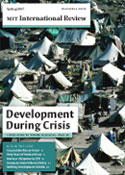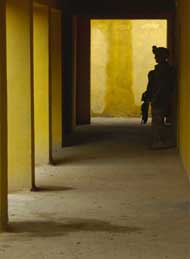- The Bush administration has made similar errors in the war in Iraq and the campaign against al-Qa’ida, reflecting its excessive faith in military force and its failure to engage in long-term strategic thinking.
- The war in Iraq has diverted resources from the United States’ campaign against international terrorism.
The Bush administration is making parallel mistakes in the war in Iraq and the war on al-Qa’ida. Thus, the war in Iraq is a distraction from the fight against al-Qa’ida, and also a gallery where errors in the larger fight against al-Qa’ida are visible in sharp relief. Administration failures in Iraq are like a dead canary in a coal mine, a warning of wider failures against our most dangerous enemy, the al-Qa’ida network.
The administration has made seven analogous mistakes in both wars:
No war of ideas: After invading Iraq, the administration did little to shape Iraqi public opinion. As a result, Iraqis are suspicious of U.S. aims—they widely believe that the U.S. invaded to steal Iraq’s oil and aims to colonize the country—leading many to support the Iraqi insurgency.
Nor has the administration waged a real war of ideas in the broader Muslim world. As a result, Muslims widely believe fanciful al-Qa’ida claims that the U.S. seeks to destroy Islam, and that the past century has witnessed unremitting one-way violence by the West on a pacific Muslim world (In fact, modern times have witnessed great two-way violence between Muslims and non-Muslims. The balance of bloodletting is roughly even. But few Muslims know this.). Majorities in Egypt, Turkey, Pakistan and Indonesia do not even believe that groups of Arabs conducted the 9/11 attack. The U.S. cannot defeat al-Qa’ida while such attitudes persist.
No deal making with players whose cooperation we need: In Iraq, the administration failed to move quickly to cut a deal with the Iraqi Sunnis. This left the Sunnis assuming they had no place in a U.S.-crafted Iraq, fueling their decision to rebel. And the administration failed to reach understandings with Syria and Iran to gain their cooperation with Iraq’s reconstruction. Yet postwar reconstruction usually fails if neighboring states do not want it to succeed.
The Bush team also failed to practice the art of the deal in the broader war on al-Qa’ida. It offered little inducement to Iran and North Korea to end their nuclear programs, recklessly talking about regime change instead. Nuclear weapons built as a result could wind up in the hands of terrorists. And the administration pushed its relations with Syria to rupture despite important Syrian help against al-Qa’ida after 9/11. Syrian intelligence cooperation after 9/11 allowed the U.S. to thwart al-Qa’ida attacks on the U.S. Fifth Fleet headquarters in Bahrain and the U.S. embassy in Ottawa. Administration hostility to Syria has ended this cooperation.
No dampening of inflammatory conflicts: The Bush team’s efforts to cool the Sunni-Shi’a conflict in Iraq have been tardy and inept. As a result, that conflict threatens to destroy Iraq and even ignite a regional conflagration.
In the broader Mideast, the Bush team has made little effort to end conflicts that feed al-Qa’ida recruiting: the Israeli-Palestinian conflict, the Kashmir conflict, the Chechnya conflict, and civil conflicts in Somalia.
Al-Qa’ida feeds on war. It exploits any war involving Muslims by painting Muslims as victims, whether or not they are. It uses regional wars as a training ground for its fighters (as it used Afghanistan in the 1980s and 1990s). Accordingly, the U.S. should work to dampen conflict throughout the region. It should be the great maker and builder of peace. But the Bush administration declines to play this role.
Little state-building: The Bush team bungled the rebuilding of the Iraqi state, the Iraqi security forces, and the Iraqi national infrastructure. As a result, Iraq now qualifies as a failed state.
In the wider Mideast, the Bush team has failed to address state failure in Afghanistan, Somalia, Lebanon, and Pakistan. This gives al-Qa’ida and other terrorist networks great opportunities to infest and flourish in the power vacuums that failed states provide.
Failed states are the best incubators for terrorists—better than the authoritarian dictatorships that draw President Bush’s concern. Accordingly, the U.S. must develop and apply the skills needed to prevent or resuscitate failed states.
No locking down of loose weapons: The Bush team failed to secure Saddam’s large conventional weapons dumps from looting. As a result, the insurgents stole vast numbers of RPGs, artillery shells, and other weapons. The IEDs that kill our troops in Iraq are made from these looted weapons.
Further afield, the administration repeats the same error regarding weapons of mass destruction. In Russia and elsewhere, enough nuclear material to make tens of thousands of Hiroshima-sized atomic bombs remains poorly secured. The Bush administration has failed to address the matter urgently, spending only $1.3 billion per year—perhaps one-third of what we should spend—on efforts to lock down these weapons and materials, and failing to appoint an effective leader to execute the policy.
These five errors reflect a mistaken Bush administration belief that deterring or smashing states is an adequate answer to nearly all problems. Against Saddam, the administration assumed that all else would fall into place once it defeated the Iraqi army. Hence, it failed to prepare for postwar problems. Against al-Qa’ida, the administration has likewise focused on preparing to smash the armies of hostile states while neglecting other tools of statecraft. Its strategy rests on the false premise that only terror groups with state sponsors can really harm the U.S., so defeating terror requires only defeating or deterring these state sponsors.
To defeat al-Qa’ida and its jihadist allies, the U.S. needs the capacity to destroy or deter states that assist them. But victory also requires the capacity to shape opinion in other societies, to prevent war or make peace among groups at war, to strike deals with others that advance U.S. interests, to save failed states, and to organize the securing of dangerous arms.
Such skills are dismissed as sissy stuff in today’s macho Washington. The Bush team assigns them only bit parts in its strategy against terror. Yet they are essential for victory over the dangerous terrorist enemies we face.
The sixth and seventh errors lie in failing to set priorities among threats, and treating potential partners as enemies. In Iraq the Bush administration failed to focus its harsh measures on the bad actors, instead using a shotgun approach that injured many innocents. Many of these innocents then became U.S. enemies in response to administration policies.
The administration pursued an extreme policy of de-Ba’athification, ousting from government jobs many thousands of ordinary Iraqis who had only pro-forma connections to the Ba’ath party. Some of those ousted joined the anti-U.S. insurgency. Moreover, many of those ousted had important technical skills needed to keep Iraq’s infrastructure working. The collapse of that infrastructure—of the power grid, water supplies, and so forth—stems in part from this radical de-Ba’athification policy. The Bush team also disbanded the entire Iraqi army in May 2003. Iraqi officers had earlier indicated that they would cooperate with the U.S. occupation if their employment was continued. But once fired, many joined the insurgency, fueling its growth and giving it important skills and firepower.
In the wider Mideast, the administration repeats these errors by failing to put top priority on defeating America’s most dangerous current enemy, al-Qa’ida, while posturing counterproductively against others. It launched the war on terror in October 2001 by invading Afghanistan and ousting the Taliban regime, which had sheltered al-Qa’ida. This was clearly the right move. But soon it took a left turn into Iraq to oust Saddam Hussein, although Saddam was not cooperating with al-Qa’ida and was otherwise contained.
One administration official, then-Deputy Secretary of Defense, Paul Wolfowitz, even argued shortly after 9/11 that the U.S. should attack Iraq while leaving alone Afghanistan, al-Qa’ida’s haven. The administration rejected his remarkable argument, but it did transfer resources from Afghanistan to Iraq before it had destroyed the al-Qa’ida leadership and consolidated the new government in Afghanistan. This allowed important al-Qa’ida elements to escape and fight another day. It also allowed the Taliban to survive and later recover strength. Today they pose a serious threat to the new Afghan government of Hamid Karzai.
As noted above, the administration also pursued hostile policies toward Iran and Syria, talking of ousting both regimes, in another left turn away from combating al-Qa’ida. Iran and Syria have odious rulers, but they are not in league with al-Qa’ida. Conflict with all three states—Iraq, Iran and Syria—is a diversion from al-Qa’ida, the main threat.
Will the administration fail as badly against al-Qa’ida as it has in Iraq? Let us hope not, as the game with al-Qa’ida is for much higher stakes. A former al-Qa’ida press spokesman, Suleiman Abu Ghaith, has claimed that al-Qa’ida has the right to kill four million Americans, including two million children. Al-Qa’ida operatives have tried to acquire ingredients for nuclear weapons, to allow them to bring this horror to pass. This is poker for keeps. Failure in Iraq is a disaster. Failure against al-Qa’ida could bring far larger calamity.






![[Image of soldiers in Iraq]](../../-img/2007/spring/articles/iraq-squad-sm.jpg)